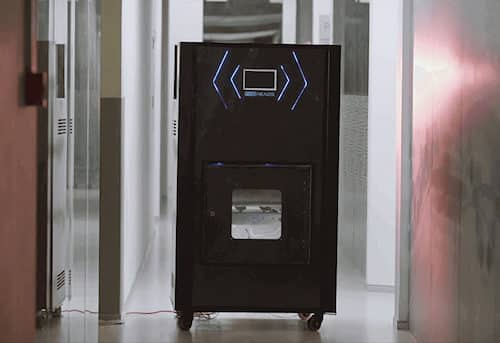Additive manufacturing has transformed production by ensuring reliable manufacturing of high-volume, end-use parts for industries ranging from aerospace to transportation. This is particularly useful for composite part manufacturing, wherein most operations are still labour-intensive and hence time-consuming
Understanding the growing demand for composite parts, Fabheads Automation was founded by Dhinesh Kanagaraj in 2015 and incubated at IIT Madras in 2016 to provide end-to-end manufacturing services. The company aims to completely automate composite manufacturing sector to meet these needs.
3D prints usually lack strength along the vertical axis. But the company offers a customisable hybrid process so that a layup is possible with fibres on both the exterior and interior of 3D prints. The hybrid process amalgamates several valuable features of three-axis fibre placement machines with composite 3D printing, to gain traditional manufacturing advantages too in making composite moulds.
The startup’s in-house FibrBot series of 3D printers with carbon fibre printing capabilities has three versions—FibrBot 300S, FibrBot 300, and FibrBot 1K—to cater to the requirements of different applications. FibrBot 300S, with a build volume of 300mm×300mm×300mm, can print small parts with medium-performance plastics as matrix, regardless of fibre reinforcement, whereas FibrBot 300 has a build volume of 325mm×325mm×300mm for printing parts with high-performance plastics as the matrix.
FibrBot 1K has a build volume of 1500mm×1000mm×700mm and is capable of printing large parts like drones and cycle frames in one go. It is also ideal for industrial uses like moulds and fixtures. Fibre compatible options for composite parts include fibre, glass, and Kevlar, while plastic compatible ones are nylon, ABS and epoxy. Maximum chamber temperature for FibrBot 300 is 200 degrees, while for other versions, room temperature is the upper limit.

Ability to print continuous fibre-reinforced parts from 3D printers broadens the range of design and fabrication possibilities with several options for material combinations like plastics, metals and fibres based on requirements. Since the choice of grade of fibre and plastic, and fibre volume ratio is flexible, the result is a precise fabrication of high-strength but low-weight parts at lower cost with a reduced lead time.
The startup not only helps other companies but also student teams with design optimisation based on such parameters as strength, weight, performance, and lifetime. It also offers assistance on rapid prototyping and limited/volume production.
The machines were launched for commercial operations in 2019. The company caters to numerous sectors requiring high-performance and light-weight components like automobile or robotics (body panels, bicycle/bike frames, battery casing, base plates), satellites or aviation (landing gears, truss, micro/nano satellite, aerofoils), and other such industries (end actuators, moulds, fixtures). Prominent customers include Dell, Planys, Avishkar Hyperloop, Skycrafts Aerospace, among others.
The startup recently was among the top three winners for Startup Competition Week organised by Lotte Corp and its accelerator Lotte Accelerator in collaboration with IIT Madras Research Park. Besides the cash prize, it got access to collaborations and investment opportunities from the Lotte Group for the future.






